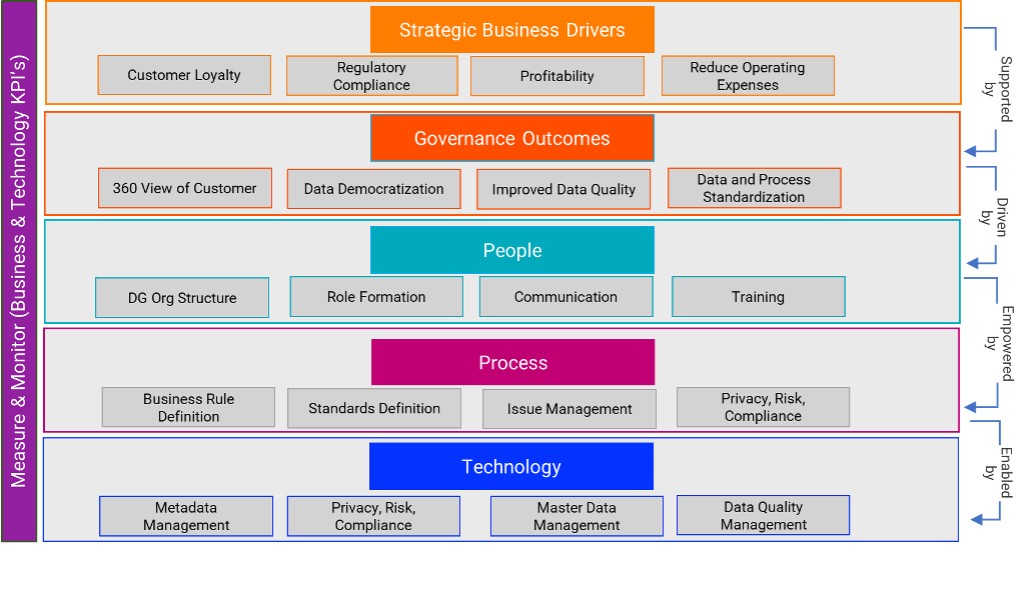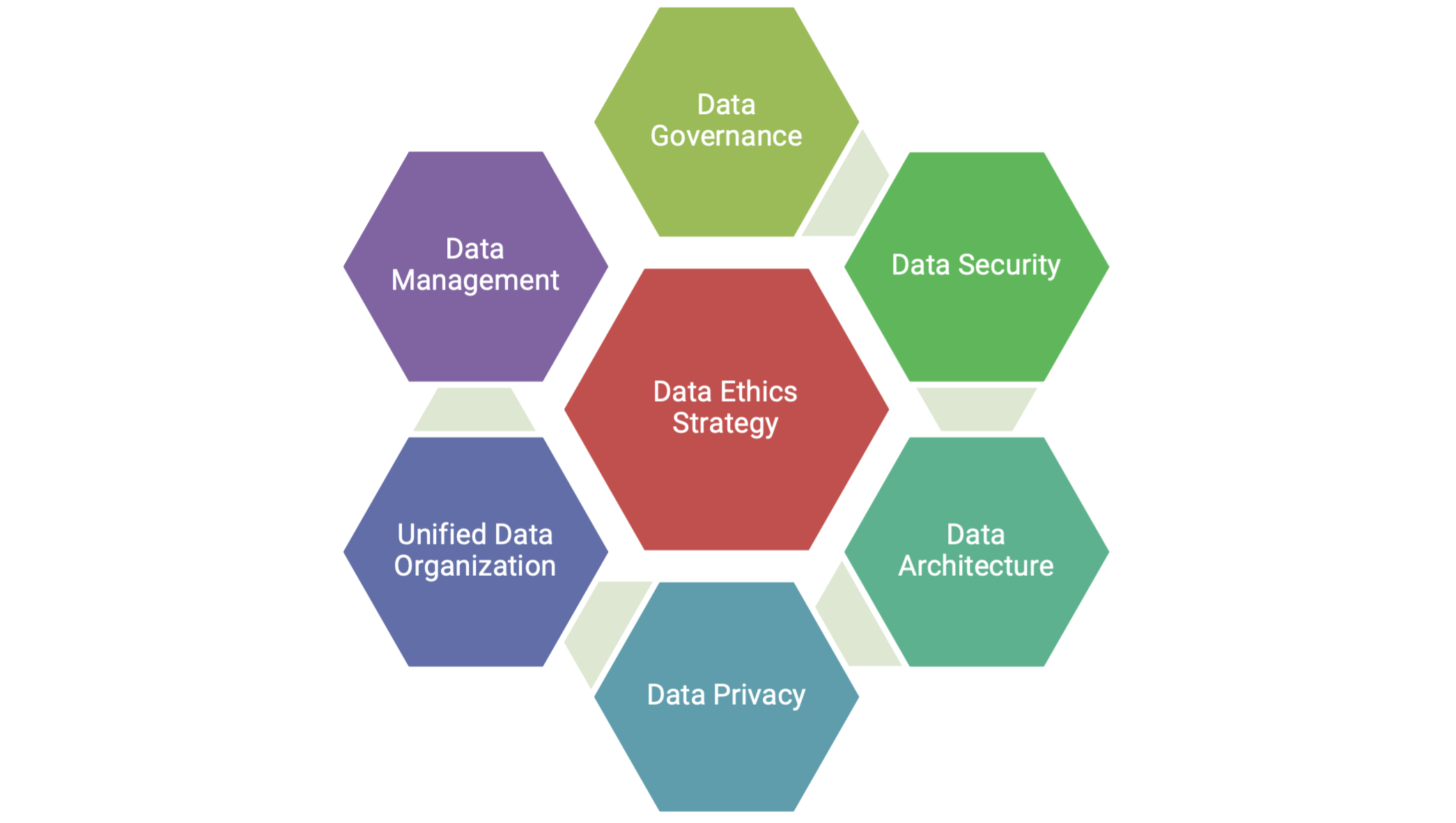Driving Business Value through Data Ethics

Given the extensive use of increasingly more data, combined with the growing reliance on algorithms for analysis to make decisions, organizations are having to investigate the provision of solutions including machine learning, artificial intelligence and robotics to process data, and ensure corresponding practices address the ethical implications resulting from the use of both personal and operational data.
Organizations need a shared vision and purpose to establish what their data strategy should incorporate, tailored to reflect their industry context. Having clarity on its vision, the values it supports and how potential data-use cases align with those values, is critical in establishing decisions around data usage. A value-based and ethical data governance framework can provide the direction for the subsequent design, implementation and use of technologies within critical business processes, ensuring data is managed ethically and governed responsibly, whilst driving wider business value creation and considerations.
Those organizations which subsequently embrace an ethical data management culture will benefit from the empowerment that a ‘hive’ mindset delivers in relation to data collection, processing, and dissemination. Through embedding additional data literacy and data governance programs, an organization can secure and utilize appropriate data to enable relevant questions to be answered, to drive effective decisions and to add value, whilst at the same time instilling trust and reflecting moral sustainability of the data which it uses.
What is Data Ethics?
Data ethics relates to good practice around how data is collected, used and shared. It is especially relevant when data activities have the potential to affect people and society, directly or indirectly. This includes data generation, recording, curation, processing, dissemination, sharing and use.
For those organizations who thrive on data-driven innovation, pursue new revenue streams and wish to monetize their data resources, they must do so in a manner that respects the privacy of both their consumers using new services and the underlying data itself.
The automation of data algorithms (including artificial intelligence, artificial agents, machine learning and robots) and corresponding practices, have been driven by vast developments in digital platforms, advanced analytics, cognitive, and AI in recent years. With these tools, vast amount of data generated by endpoints is gathered, analyzed, and turned into the basis for decision making. However, questions remain in relation to algorithmic “bias” and the validity of those decision-making capabilities.
Consequently, it is now necessary to consider ethical matters with both current and future uses of data in order to build trust with individuals, consumers, citizens and organizations, helping to drive ethical measures when establishing new venture creation and business value, whist responding to regulatory compliance requirements.
Delivering an Ethical Data Governance Framework
Organizations need a shared vision and mission for what their data program will look like, tailored to their industry in a global or localized context. Being clear on the company’s vision, the values it supports, and how a potential data use case aligns with those values is critical and can guide decisions around data usage.
In addition, external regulation will tend to focus primarily on how organizations collect, store and disseminate data. The European Union’s General Data Protection Regulation (GDPR), for instance, focusses on the lawful purposes of processing data and mechanisms for data handling, however further ethical practices will still need consideration as to the “why” and “should” of data sharing and decision making.
By embarking on delivering a value-based and ethical data governance framework, ensure that not only strategic business objectives are met, but that the underpinning data strategy can sustain both ethical and regulatory challenges. Informatica’s Data Governance Framework focuses on the following overarching principles:
- Strategic Business Drivers: Strategic Business Drivers define the business goals and critical success factors that help drive the success of the organization.
- Governance Outcomes: Results that need to be realized to support the Strategic Drivers within an organization.
- People and Behaviors: Anyone working directly or indirectly with data, including data practitioners (statisticians, analysts and data scientists involved with assessing algorithms), operational staff and those helping to produce data-informed insight. Define roles and behaviors for the ethical use of data and data ownership, determining accountability for the stewardship of data, in parallel with data governance, security and data protection responsibilities.
- Organization and Process: Structured cross-functionalexecutive committees and steering groups aligned to the remit of the data organization i.e. Chief Data Office, to ensure periodic review and discussion of data opportunities against organizational and ethical values. Embed Data Governance processes empower people to formally manage data assets throughout the enterprise. These processes ensure that trusted data is used for critical business processes and decision making.
- Data and Technology: Ability to discover and determine the quality and limitations of available data. Ensure technology capabilities include the platforms, tools, and subject matter expertise required to enable a sound data governance process.
In addition, the Data Governance Framework provides foundational building blocks to address data ethics challenges and opportunities.

Building an Ethical Data Management Culture
The key to building an ethical data management culture is in part, establishing the right behaviors combined with supporting capabilities. Data leaders must understand what kind of resources and expertise will be needed to meet ethical challenges, posed by emerging data-driven programs, as cultural change embeds itself over time.
Organizations must inspire people to believe that change is necessary to achieve the right governance around data processing, data sharing, and data management. To address and influence cultural change, organizations must illustrate how data influences different styles of decision making and what outcomes will change as a result.
Consider Organizational Structure
Data ethics should be considered across organizational boundaries, processes and across different types of data, whether those activities or processes tend toward a more traditional “front “or “back” office approach. Ethical questions should be considered for every process in which data plays a role. Once it is clear whether an activity or process has a data aspect, it is important to ask questions about what ethical risks might be present, and how to address them.
As part of delivering necessary cultural change, and to ensure successful implementation of Informatica’s Data Governance Framework, organizations should consider its structure for handling data and embark on relevant data literacy and educational programs. This will provide the mechanisms for upskilling staff in data-related disciplines and capabilities, governance processes and cross-boundary knowledge and data collaboration.
Responsible data use is part of knowing how to use data, how to address ethical risks, and how to protect privacy, maintain confidentiality, whilst achieving business objectives. Data knowledge must be at the forefront of the organization and be considered part of the value structure, not at the helm of siloed functional thinking, or left as a responsibility of the IT department.
As part of developing a Data Ethics strategy, the unified data organization, such as the Chief Data Office, is necessary to bridge thegap between in-flight data analytics, data management, data governance and privacy activities, while balancing mandatory regulations. The role of the unified data organization should seek to act as coach or change-agent by proliferating data responsibilities, under its guardianship, within cross-functional teams, whom will have the data skills and governance knowledge to address new ethical risks, challenges and opportunities.

In addition, those cross-functional teams which embrace collaborative tools and technologies can play a vital role in adopting data literacy and ethical considerations via a “hive” mindset. Data Governance tools and platforms can promote efficient, self-use for data stewardship processes, and enable systematic change and quality control for trusted, transparent and effective decision-making.
By embedding an ethical data governance framework, a unified data organization, data literacy curriculum and enabling capabilities, organizations will have the necessary foundations to approach data ethics in a value-based way. Business outcomes focused on value creation will be more successful by embracing a winning mix of trust, ethics and transparency at the heart of the individuals depending on it.
Key takeaways
- Drive value and business outcomes using ethical practices when using data
- Implement Informatica’s Data Governance Framework to ensure a sound approach to data use, management and stewardship
- Implement collaborative Data Governance tools to foster an ethical data management culture and improve data literacy efforts
Learn more








